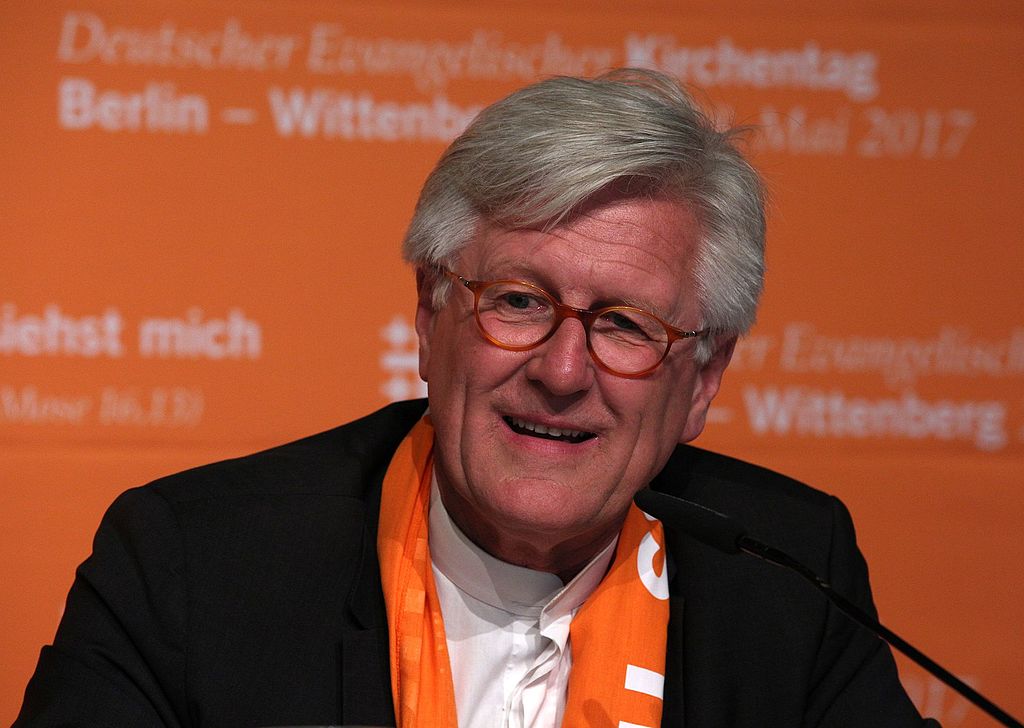The Social Science Institute of the Evangelical Church in Germany (EKD) has published a new study titled “Islam and Muslims in Germany: The population’s view”. Just over 2000 respondents were questioned on the phone with respect to their perception of Islam’s place in German society. The study’s results can be accessed here.
Although it is not stated explicitly, throughout the presentation of the findings the reader is led to assume that only Protestant, Catholic, and unaffiliated respondents were contacted to participate in the survey. “The population’s view [Die Sicht der Bevölkerung]” that the study promises to capture is thus the view held by Christian and atheist Germans only – a discursive framing that, in a single stroke, excludes Muslims and other religious groups from the German collective. This makes for a somewhat inopportune opening to a study presented by the EKD as a testament to the Church’s positive apprecitation of religious pluralism.
Rejection of Islam…
The EKD’s survey follows in the footsteps of a plethora of quantitative research. Compared to these already existing studies, the Church’s survey has few dramatically novel insights to offer. Instead, a familiar picture of antipathy towards Islam emerges: only 33 per cent of respondents agree that “Islam fits with German society” (54 per cent reject this claim). ‘Islam’ and ‘German society’ are construed as irreconcilable opposites.
Conversely, 69 per cent (as opposed to 24 per cent) assert that “Muslims are part of everyday life in Germany”. Respondents thus repeat a contorted argumentative figure frequently made by German politicians: they assert that Islam is not part of the German nation; yet they shy away from openly denying Muslim individuals the right to belong. (How a Muslim could be German while their faith is stylized as radically un-German remains unclear, however.)
… acceptance of Muslims?
The survey report concludes that ‘the population’ has a negative view of Islam but a positive perception of Muslims. This conclusion is not fully warranted, however. For the assertion that “Muslims are part of everyday life” is merely a statement of fact: there are, after all, roughly 4.5 million Muslims living in Germany. The recognition of this fact does surely not betray a positive view of this social group.
And indeed, 54 per cent of respondents “have the impression that there are many religious fanatics among Muslims in Germany” (32 per cent disagree); and 45 per cent are opposed to the idea of having a Muslim mayor in their town (43 per cent would accept a Muslim representative).
Equally noteworthy is the rejection of Islamic religious education in schools. The German constitution provides for faith-based education in public schools for pupils of major religious groups. When 56 per cent of respondents want to deny Muslims this right (as opposed to 33 per cent who support its realisation), they therefore flirt with patently unconstitutional arguments.
The ‘contact hypothesis’
Overall, 73 per cent of respondents claim to have contact to Muslims in various situations of everyday life – such as private affairs, in the workplace, in social life, and in the service sector. More highly educated, younger, and West German respondents are more likely to encounter Muslims than their less educated, older, and East German counterparts.
What is noteworthy is the fact that such personal contacts alleviate anti-Muslim prejudice but do not dispel it: a majority of those who are in touch with Muslims still think that Islam is alien to German society and that there are many religious fanatics among German Muslims; a similar majority also continues to reject Islamic religious education in schools.
The imperative of ‘dialogue’
The survey covers some novel ground when asking respondents how the Evangelical Church should position itself in relation to Islam and Muslims. 63 per cent of respondents encourage the Church to retain or expand its dialogue with Islam and high-level Muslim representatives. (It remains somewhat unclear as to whether it is ‘Islam’ or ‘Muslim leaders’ that are targets for dialogue.)
Beyond the most abstract generalities, the contours of such ‘dialogue’ remain hazy, however: as to the content of dialogue activities, they should deal with “social issues” (64 per cent), “religious issues” (42 per cent), and “political issues” (32 per cent).
The aim of dialogue should be to contribute to “social cohesion” (67 per cent), to “enforce respect for the rules of societal living-together [Zusammenleben]” (61 per cent), to enhance “understanding” of Islam (54 per cent), and to strengthen the “recognition” of the Christian faith (47 per cent). (These latter two, more explicitly inter-religious concerns receive stronger support from Christian than from non-Christian respondents.)
Unity across faiths
‘Dialogue’ thus appears as a relatively vacuous signifier, in which the Evangelical Church is potentially tasked with communicating the ‘rules’ and ‘values’ of a Christian-infused German culture to Muslim immigrants and their descendants.
These expectations are more or less equally shared by Christians and non-Christians. To be sure, in some contexts Christian respondents show a slightly greater sensitivity to distinctly religious concerns – emphasising the interreligious nature of the Muslim question. Ultimately, however, Protestants, Catholics, and the unaffiliated express similar views of Islam and Muslims.
The position of the Church
It is not fully clear what the Evangelical Church can or will take from these survey results. Now it has conducted its own study confirming what we already knew before: that Germans, including those identifying as Christian, are extremely sceptical of and prejudiced against Muslims.
This complicates the position of the Church and its leading figures. Over the last decade, German Church leaders – Evangelical as well as Catholic – have often admonished compassion towards migrants, as well as acceptance of Muslim religiosity. In doing so, they have not only departed to some extent from their own earlier positions; they have also distanced themselves from the politics emanating from some quarters of the Christian Democratic and Christian Social Union parties (CDU/CSU).
Defence against ‘laicism’
In a newly published position paper accompanying its survey, the EKD stresses that it sees itself as committed to the defence of religious freedom of all religious groups in Germany. This includes, in particular, the right to exercise one’s religion in the public sphere – a right which the EKD sees as under assault from a turn towards laicism (Laizismus).1
Thus, from the perspective of at least some Church leaders, supporting Muslim believers is a potentially important contribution to strengthening the legitimacy of religious observance in a secularised society. This puts the Church leadership at odds with its flock: for instance, only 34 per cent of survey respondents assert that “Christians should advocate for the construction of a mosque”, with 51 per cent opposing this idea.
Thus, there are signs that the Churches’ political positioning may not go down well. In the context of the weaponization of Christianity for the purposes of anti-immigrant identity politics, a growing swath of Christian and non-Christians might have little patience for the EKD’s ecumenism.






